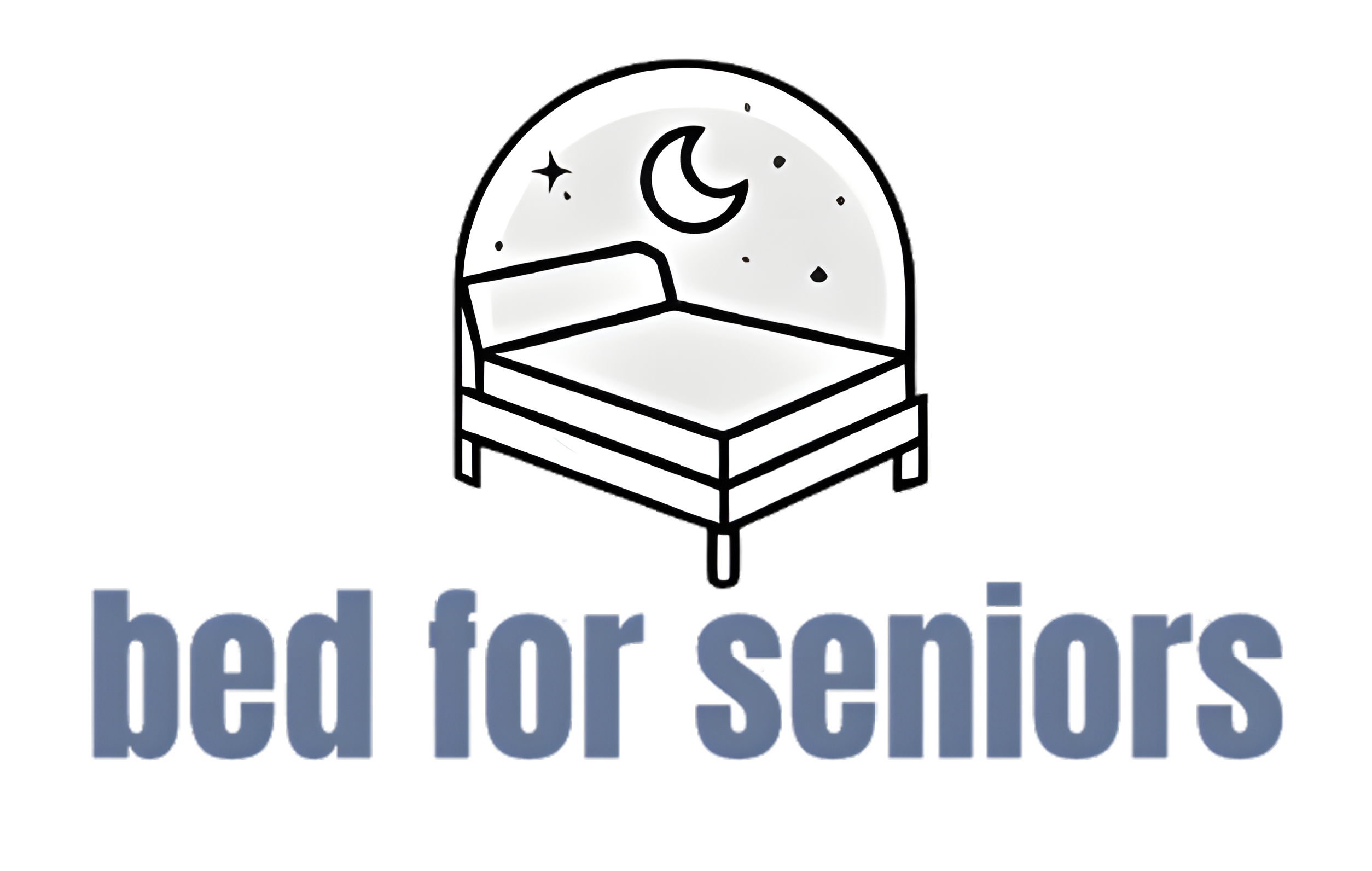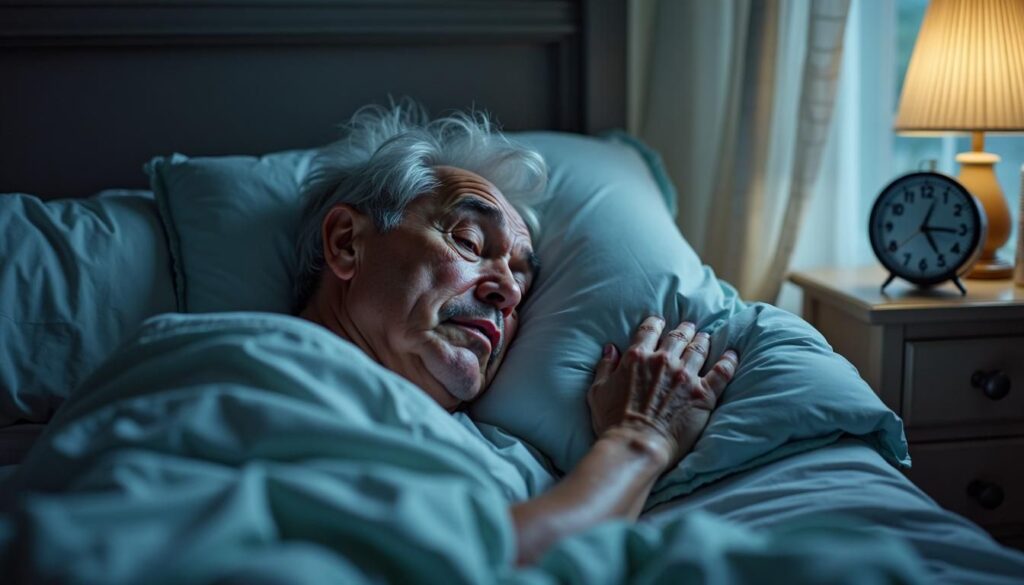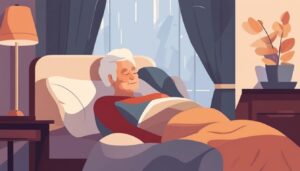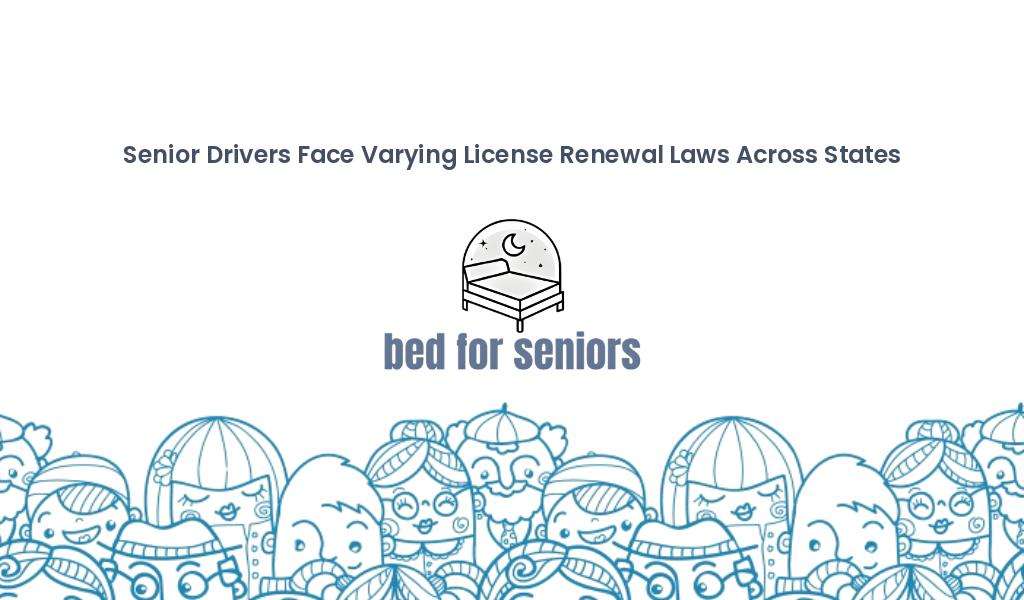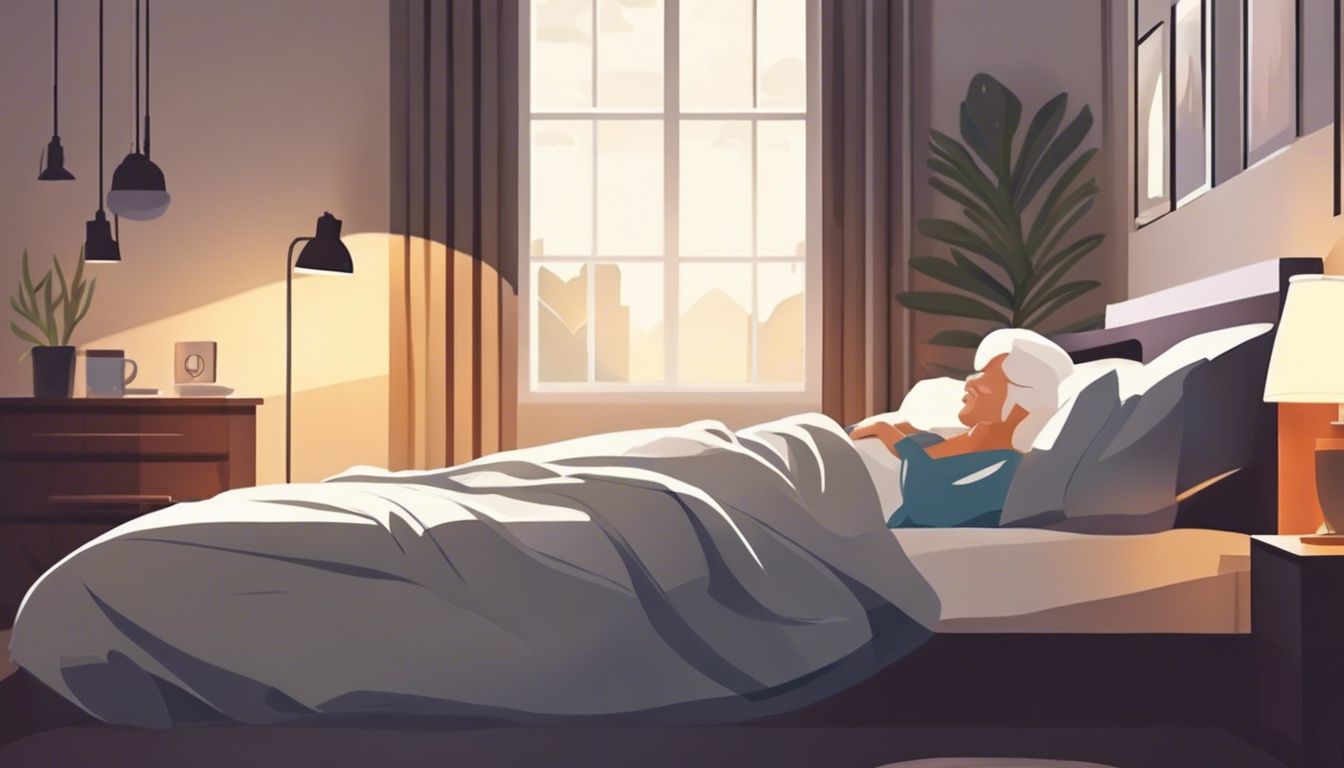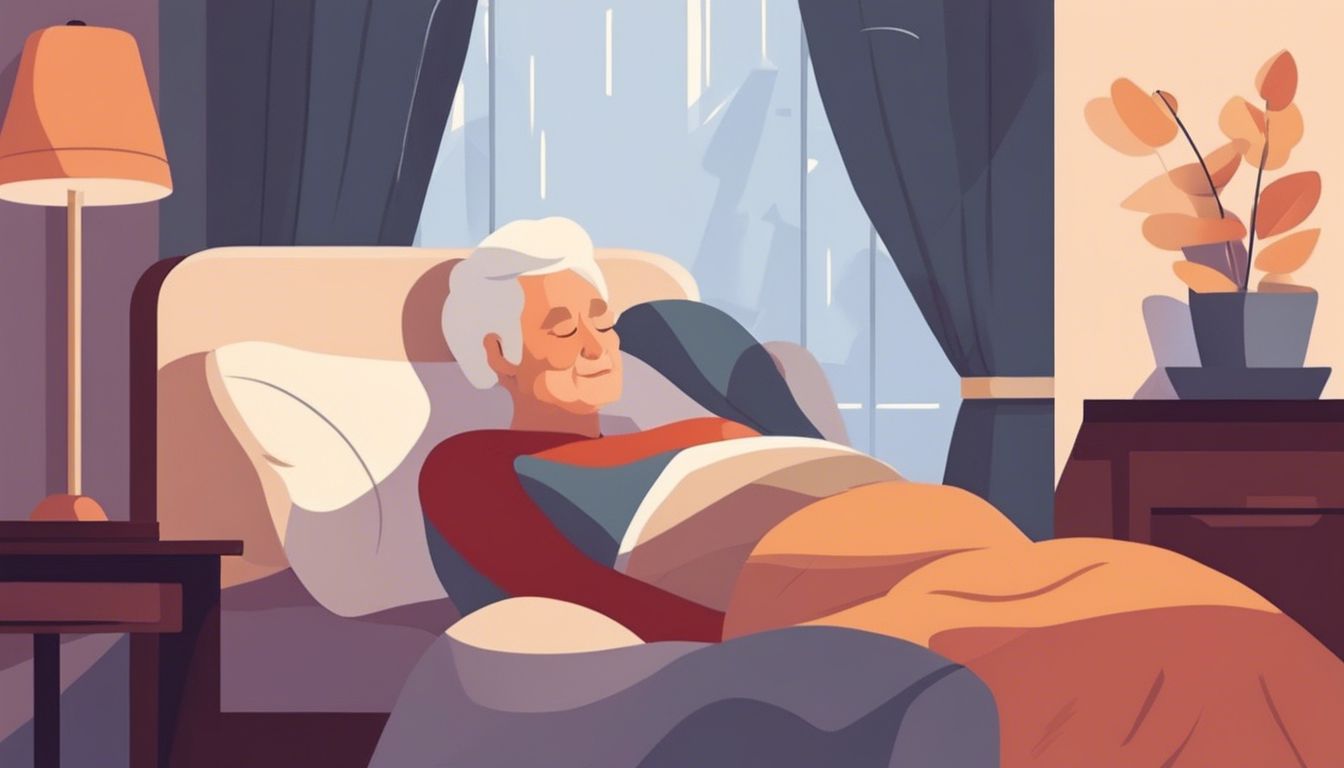Many older adults face trouble sleeping at night. This problem often links to their brain health getting worse. Our article explains how not sleeping well affects an older adult’s mind and memory.
Keep reading to learn more.
📋✅
- Not sleeping well is bad for older adults’ brains. It can cause memory problems and make it hard to think.
- Common sleep troubles like insomnia and sleep apnea are linked to mental decline. Fixing these issues can help people think better.
- Sleep stages are important for brain health. Making sure older adults get good sleep can protect their mind as they age.
- Doctors use tests like the Mini-Mental State Exam to check on brain health. They also study how well someone sleeps.
- Making simple changes in daily life can improve sleep and keep the brain sharp. This includes setting a regular bedtime and staying active.
Overview of Sleep Disorders in Older Adults
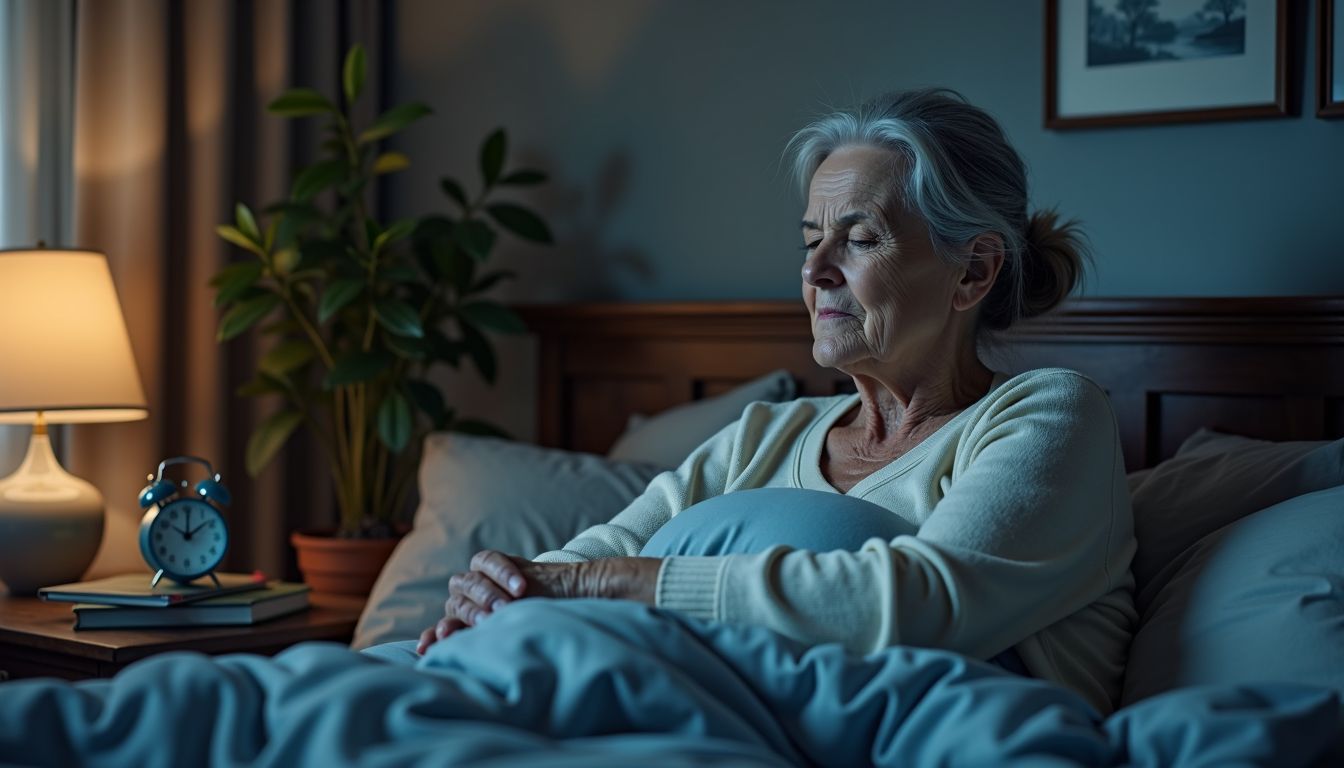
Many older adults face sleep troubles, like taking longer to fall asleep or waking up often during the night. Researchers find these issues common, impacting how well they rest and feel in the day.
Types of Sleep Disorders Commonly Observed
Sleep disorders in older adults can hurt their health. Here is a list of common sleep problems:
- Insomnia: This means having trouble falling asleep or staying asleep. Older adults with insomnia often feel tired during the day.
- Sleep-disordered breathing: This includes conditions like sleep apnea, where breathing stops and starts during sleep. It can lead to cognitive decline if not treated.
- Restless Legs Syndrome (RLS): People with RLS have an urge to move their legs, which can keep them awake at night.
- Rapid Eye Movement (REM) Sleep Behavior Disorder: In this condition, people act out dreams because the muscles that should be still during REM sleep are active.
- Circadian rhythm disorders: These happen when the internal clock is off, causing people to feel sleepy or awake at the wrong times.
- Sleepwalking: Some older adults walk in their sleep, which can be dangerous and disrupts good sleep.
Each disorder affects sleep quality and duration, two critical factors for keeping the mind sharp as we age.
Prevalence of Sleep Disorders Among the Elderly
Many older adults face sleep problems. A big study found that over 5,000 grown-ups showed a strong link between how much they sleep and how well their brain works. Too little or too much sleep can harm verbal skills and memory.
Sleep-disordered breathing (SDB) is more common in the elderly, affecting their cognitive abilities similar to aging itself. Also, folks with long-lasting insomnia who use sleeping aids for a long time have twice the risk of getting dementia after three years.
Moving on, we will explore how poor sleep affects an older adult’s mind and thinking skills.
Cognitive Decline in Older Adults
The cognitive function in older adults may diminish, resulting in a slower functioning brain and difficulties in memory retention or the acquisition of new knowledge. This could be indicative of more serious health conditions, such as Alzheimer’s disease or dementia.
Defining Cognitive Decline and Dementia
Cognitive decline is a phenomenon where individuals tend to forget more and think slowly as they age. This can involve challenges in memory recall, concentration, and decision making.
Dementia, on the other hand, is more severe than just minor memory lapses. It refers to a person’s loss of capability to perform common tasks due to significant brain alterations. Common symptoms can include inability to recall recent occurrences or significant difficulty in verbal communication and understanding language.
A certain research has associated sleep-breathing disorders (SDB) such as severe snoring with declining cognitive function over a span of three years. Elderly adults are at a greater risk of mild cognitive impairments and severe dementia earlier than the younger population.
Poor sleep quality can cause decreased oxygen levels and fragmented rest, which further exacerbates the deterioration of brain health.
Common Cognitive Diseases in Aging Populations
Upon learning about cognitive decline and dementia, our focus now shifts to particular mental health challenges that older adults face. These problems significantly contribute to their overall well-being.
- Alzheimer’s disease (AD) – This neurological condition results in memory loss, cognitive difficulties, and behavioral changes. It is the predominant cause of cognitive aging.
- Vascular dementia – Following Alzheimer’s, this occurs due to circulatory disturbances to the brain, compromising one’s ability to strategize, think logically, and recall.
- Lewy body dementia – This form of dementia is caused by minute deposits of a protein called alpha-synuclein in the brain, impacting sleep, behavior, and motility.
- Frontotemporal dementia – This disorder affects the frontal and lateral parts of the brain, altering personality and linguistic abilities prior to affecting memory.
- Mixed dementia – Some elderly individuals exhibit symptoms of multiple forms of dementia concurrently.
- Parkinson’s disease – Over a period, this ailment can progress into Parkinson’s disease dementia, characterized by motor function problems followed by memory issues.
- Mild Cognitive Impairment (MCI) – This condition isn’t as intense as full-blown dementia but displays noticeable declines in cognitive functions like memory and thinking abilities.
Each condition holds unique consequences but all of them severely impact the quality of life of an elderly individual. Identifying these at an early stage can aid in devising management strategies that aim at decelerating their advancement.
Linking Sleep Disorders and Cognitive Decline
Poor sleep hurts your brain’s health. Studies find that not sleeping enough can lead to memory problems and trouble thinking.
Impact of Poor Sleep Quality on Cognitive Health
Sleeping for a duration less than 5 hours impacts cognitive functions. Research demonstrates it complicates thought processes and memory retention for elderly women. These individuals also display lower performance on exams assessing cognitive capabilities.
This information is derived from a study comparing well-rested individuals—those sleeping for 7 hours—with sleep-deprived ones.
Shifts in sleep quality, such as frequent awakenings or a lack of deep sleep, are also associated with these issues. Scientists discovered that both excessive and insufficient sleep impair various cognitive abilities in older adults.
This implies that obtaining an optimal sleep duration is vital for maintaining mental clarity with advancing age.
Sleep Duration and Its Effects on Cognition
Research indicates that both excessive and insufficient sleep can adversely impact the brain’s cognitive capacity. An investigation involving over 3,000 aged individuals discovered that those who indulged in extended sleep periods exhibited inferior cognitive functionality.
Further research involving more than 5,000 participants revealed both extended and short sleep durations corresponded to decreased performance in verbal aptitude and list recall. This underscores the significance of sleep duration in determining cognitive performance.
Total wake time (TWT) is higher; psychomotor speed and memory are lower.
The aforementioned fact underscores the distinct correlation between inconsistent sleep cycles and decreased cognitive capacity. The discoveries recommend maintaining a steady sleep cycle is essential in preserving optimal brain functionality as we age.
Role of Sleep Architecture in Cognitive Functions
Sleep stages play a key role in brain health. Disrupted patterns can harm memory and learning.
Stages of Sleep and Their Importance for Cognitive Processes
Sleep goes through different stages. Each one matters for keeping the brain sharp and healthy. Here’s how each stage plays a crucial role:
- Non-REM Sleep – This is the start of the sleep cycle. The body relaxes, heart rate slows, and brain waves begin to slow down. During this stage, it links to memory consolidation, which helps with learning new information.
- Deep Non-REM Sleep – Next comes deep sleep. It’s hard to wake up from this stage. This part is vital for physical recovery and growth hormone release. It also plays a role in emotional regulation and memory storage.
- REM Sleep – This final stage is where dreams happen most often. Brain activity picks up again, almost like being awake. REM sleep is key for processing emotions, storing memories, and learning skills.
- Slow-Wave Sleep (SWS) – Part of non-REM sleep, SWS declines with age but is important for cognitive processes like decision-making and attention.
- Total Wake Time (TWT) – Longer periods awake at night link to lower speed in thinking and worse memory in older adults who otherwise sleep normally.
- Rapid Eye Movement (REM) Sleep decreases as people get older too but remains important for understanding complex tasks and forming memories.
Taking care of these sleep stages can help maintain or even improve cognitive functions as one ages.
Disruptions in Sleep Patterns and Cognitive Impairments
Alterations in the sleep patterns of older adults can contribute to cognitive and memory issues. These shifts involve frequent nocturnal awakenings and the sensation of fatigue post-sleep, owing to the fact that optimal sleep benefits our cognitive functioning.
Interruptions in sleep can complicate these cognitive processes.
The quality of sleep directly influences the thought processes of older adults. Research indicates that individuals with disrupted sleep often struggle with memory retention and problem-solving tasks, along with decreased focus.
This aligns with the understanding that the brain requires rest to interpret information accurately.
Consistent restful sleep maintains cognitive acuity.
Specific Sleep Disorders and Their Cognitive Outcomes
Different sleep problems can lead to thinking troubles in older people. For example, not getting enough rest might cause memory issues, while conditions like sleep apnea link closely to brain function problems.
Insomnia and Cognitive Decline
Insomnia influences people’s cognitive abilities and memory retention. Research indicates that individuals with insomnia display suboptimal performance on challenging tasks. Their performance on simpler tasks may appear satisfactory due to heightened wakefulness and alertness.
However, their cognitive functioning deteriorates under demanding circumstances. This issue is of concern since enduring insomnia can result in further deterioration of memory and cognitive abilities.
Individuals suffering from chronic insomnia demonstrate an elevated risk of developing dementia, significantly concerning for the elderly population. Persistent sleep disturbances over the years impair the brain’s information-processing capabilities and clarity of thought.
Consequently, early intervention in sleep disturbances could potentially maintain cognitive acuity as people age.
Sleep Apnea and Cognitive Function
Sleep apnea affects how the brain works. Studies show people with higher respiratory disturbance indices have trouble paying attention. They also do worse in tests that measure executive function, like solving problems.
This condition leads to less oxygen in the blood during sleep. So, it harms overall brain functions.
Severe sleep-disordered breathing is linked to bad memory and finding words slowly. With these issues, everyday tasks get harder for older adults. Treatment can help improve these cognitive problems over time.
Restless Legs Syndrome and Cognitive Effects
Progressing from the topic of sleep apnea, we shall discuss Restless Legs Syndrome (RLS) and its impact on the mind. RLS has the potential to interfere with the cognitive functions of senior adults due to discomfort in their legs, primarily during the nighttime, challenging them to achieve sound sleep.
RLS affected adults frequently encounter sleep disturbances. This disturbed sleep gradually impairs their cognitive health. Physicians must address RLS to enhance these adults’ cognitive abilities.
The primary objective is to improve the sleep quality to augment cognitive performance.
A well-structured treatment plan for RLS results in improved sleep and enhanced cognitive clarity.
Mechanisms Underlying Sleep-Cognition Relationship
Poor sleep modifies our brain in undesirable manners. It can induce inflammation and interfere with our cognitive health, complicating our abilities to think with precision or recall information.
Neurobiological Changes Due to Disrupted Sleep
Disrupted sleep leads to neurobiological changes in the brain. Sleep disorders can cause high levels of hypoxemia. This lowers oxygen in the blood, hurting the brain’s health. It also increases risks for mild cognitive impairment and dementia.
Sleep fragmentation and excessive daytime sleepiness affect the whole brain’s work. These issues are linked with worse global cognitive functioning in older adults. Next, we’ll explore how inflammation relates to cognitive health after bad sleep patterns disrupt it.
Inflammatory Responses and Cognitive Health
Inflammatory responses can negatively impact brain health. Such reactions may cause cognitive degradation, posing a significant challenge for the elderly. Research indicates that poor sleep can activate these detrimental inflammatory responses, affecting memory and cognitive abilities.
Sleep disordered breathing (SDB), for instance, frequently leads to bodily inflammation that, over time, can harm the brain. Consequently, individuals with SDB may struggle with memory retention or decision-making processes.
Next, we’ll discuss the methods physicians employ to diagnose such issues.
Diagnostic Approaches
To figure out if an older adult has sleep problems or cognitive decline, doctors use special tests. They might use a brain function check-up called the Mini-Mental State Exam and sleep studies like polysomnography to see what’s going on.
Cognitive Assessments for Older Adults
Cognitive assessments for older adults include tests like the Mini-Mental State Examination. These exams check on brain functions such as memory, focus, and decision-making. Doctors use them to spot problems early.
There are specific tests too, such as the Hopkins Verbal Learning Test. They dig deeper into areas like word recall and learning skills.
These tools help find signs of cognitive decline or diseases like dementia. Neuropsychological tests point out issues tied to sleep-breathing disorders (SDB). By looking at global functioning and executive function, these assessments give a clear picture of an older adult’s cognitive health.
Sleep Assessment Tools and Methods
Evaluating sleep in older adults needs precise tools. Two main methods, polysomnography (PSG) and actigraphy, help in this task.
- Polysomnography (PSG): This test happens in sleep labs. Doctors attach sensors to the patient’s body to watch brain waves, oxygen levels, heart rate, and breathing while they sleep. PSG shows how deep a person sleeps and finds issues like sleep apnea.
- Actigraphy: Patients wear a small wrist device that tracks movement and light. It records when they fall asleep and wake up over several days or weeks. This tool helps understand sleep patterns outside of a lab setting.
These methods provide vital data on sleep efficiency, start times for falling asleep, and waking moments after sleeping begins. They offer insights into the architecture of sleep and its effects on thinking skills. They show the link between disordered sleeping and cognitive problems.
Next, we explore how managing sleep disorders can improve cognition in older adults.
Treatment and Management Strategies
To fight cognitive decline from sleep disorders, doctors use various strategies. They might offer medicine or suggest changes in daily habits to help sleep better and think clearer.
Managing Sleep Disorders to Improve Cognition
Treating sleep problems helps older adults think better. Research shows that fixing sleep issues, like with PAP treatment, boosts memory and planning skills. This means doctors use tools like the Pittsburgh Sleep Quality Index to find sleep troubles.
Then, they might give medicine or suggest new habits for better rest.
Good sleep changes how the brain works in a positive way. It fights off diseases that make thinking hard, such as Alzheimer’s disease. Caregivers can help by making sure seniors have a healthy routine for sleeping.
This includes going to bed at the same time each night and keeping their bedroom quiet and dark.
Pharmacological Treatments
Pharmacological treatments help manage sleep disorders in older adults. These treatments can reduce symptoms that lead to cognitive decline. Here is how they work:
- Doctors prescribe hypnotics to control insomnia. This helps patients fall asleep faster.
- Long-term use of these medicines can raise the risk of dementia. It’s important for caregivers to watch for changes in behavior.
- Research shows mixed results on whether these drugs improve brain functions like memory or concentration.
- The impact varies depending on the person’s health, type of hypnotic, and dosage.
Next, we’ll talk about non-pharmacological ways to manage sleep disorders and protect cognitive health.
Non-Pharmacological Interventions
Non-pharmacological treatments help older adults sleep better and think clearer. These methods are practical and safe.
- Sleep restriction limits time in bed to match actual sleep time, reducing wakefulness.
- Cognitive restructuring changes negative thoughts about sleep into positive ones.
- Sleep hygiene involves habits that promote good sleep, like keeping a regular bedtime.
- Bright light exposure during the day helps set the body’s internal clock.
- Structured physical activity improves sleep quality and overall health.
- A Brief Behavioral Treatment for Insomnia can cut down on the time spent awake after falling asleep.
- These methods may have varied results on thinking abilities but generally support better brain function.
Together, these steps create a plan to combat sleep issues without medicine, aiming for rested nights and sharper days.
Preventive Measures
Simple changes in lifestyle can boost sleep quality and prevent cognitive decline. Explore more to find out how!
Lifestyle Modifications to Enhance Sleep Quality
Lifestyle changes can improve sleep quality. These changes also boost cognitive health for older adults.
- Set a regular bedtime and wake-up time to create a consistent sleep cycle.
- Exercise daily, but avoid vigorous activities close to bedtime.
- Keep the bedroom quiet, dark, and at a comfortable temperature.
- Limit caffeine and alcohol intake, especially in the evening.
- Avoid heavy meals or large amounts of liquids before bed.
- Practice relaxation techniques like deep breathing or meditation to reduce stress.
- Use the bed only for sleep and intimacy to strengthen the association between bed and sleep.
After modifying lifestyle habits to enhance sleep quality, focusing on cognitive training can further help counteract decline in older adults.
Cognitive Training to Counteract Decline
Cognitive training can help older adults after their sleep gets better. Studies show it makes brain functions stronger. This means older people can learn new skills easier, especially after a good night’s rest.
Adding mental exercises to sleep care makes outcomes better for the brain.
For example, activities that push the brain to work harder are key. They help fight off age-related memory problems. The goal is simple: use it or lose it. By keeping the brain active, seniors can keep their minds sharp.
Next, we look at how healthy sleep habits support seniors with dementia.
Supporting Healthy Sleep Habits in Seniors with Dementia
Creating good sleep habits helps seniors with dementia. Sleep problems make thinking and memory worse in older adults. One way is to keep a regular bedtime routine. This can include quiet activities before bed, like reading.
Another tip is making the bedroom comfortable for sleep only.
Limiting naps during the day can also help at night. Too much sleep in the daytime makes it hard to sleep well at night. It’s helpful to get light during the day too. Light helps keep our body clock on track.
Now, let’s move on to recent research about sleep and how it affects our minds as we age.
Recent Research and Future Directions
New studies point to exciting paths for understanding how sleep affects our thinking as we age. Researchers are using tools like the Pittsburgh Sleep Quality Index and brain imaging to dig deeper, aiming to find better ways to protect our minds from decline.
Key Findings from Recent Studies
Older adults who follow PAP treatment show better brain skills. Using PAP for a long time can slow down brain problems in those with Alzheimer’s. Research says SDB makes brain work worse in older people.
PAP helps improve memory and thinking skills.
This opens doors to new areas needing more study.
Areas Requiring Further Research
From recent studies, it’s clear we need to dig deeper into how sleep affects brain health in older adults. More work is necessary to show how positive airway pressure (PAP) treatment can help the brain.
Scientists also need to study how normal changes in sleep as people get older impact their thinking and memory skills. It’s important to look at how fixing sleep problems might work better when done together with activities designed to keep the mind sharp.
We should pay more attention to using tools like actigraphy, which tracks movement and rest patterns, to understand the link between sleep quality and cognitive function. This approach will give us clearer insights into preventing mental decline by improving sleep habits among the elderly.
Conclusion
Sleep disorders significantly impact the cognitive abilities of elderly individuals. This connection is well-established. Research indicates that poor sleep quality can result in memory impairment, reduced attention span, and decision-making difficulties.
For instance, disorders such as insomnia and sleep apnea correlate strongly with a decrease in these cognitive faculties as individuals grow older. Alleviating sleep-related issues can enhance brain functions like memory and concentration.
Simply put, optimum sleep contributes to an improved mental health in the elderly.
FAQs
1. What’s the link between sleep disorders and cognitive decline in older adults?
Sleep disorders, like insomnia symptoms and obstructive sleep apnea, can lead to cognitive deficits. Disruptions in total sleep time or slow wave sleep may impact executive functioning, working memory, processing speed, episodic memory and verbal fluency.
2. How do researchers study this relationship?
Researchers use various methods such as mini-mental state examination (MMSE), analysis of variance (ANOVA), regression coefficient calculations for statistical analyses. They conduct cross-sectional studies, cohort studies and longitudinal patterns of sleep for data analysis.
3. Are there other factors that could influence this connection?
Yes! Factors like body mass index (BMI), cardiovascular disease, heart disease or metabolic syndrome might be confounding factors affecting both sleep quality and cognitive health.
4. Is there a genetic component involved in this relationship?
Research suggests that certain genes like apolipoprotein E play a role in neurodegenerative processes linked with Alzheimer’s disease – which is associated with poor sleep quality.
5. Can anxiety affect the correlation between sleeping problems and mental decline?
Indeed! Anxiety can exacerbate insomnia symptoms leading to increased risk of mental disorders including neurodegeneration leading to short-term memory loss.
6. How are these conditions diagnosed?
Diagnosis involves screening using tools like Pittsburgh Sleep Quality Index (PSQI) for assessing self-reported sleep duration & latency; DSM-IV – Diagnostic & Statistical Manual of Mental Disorders is used for diagnosing mental issues related to cognition.
